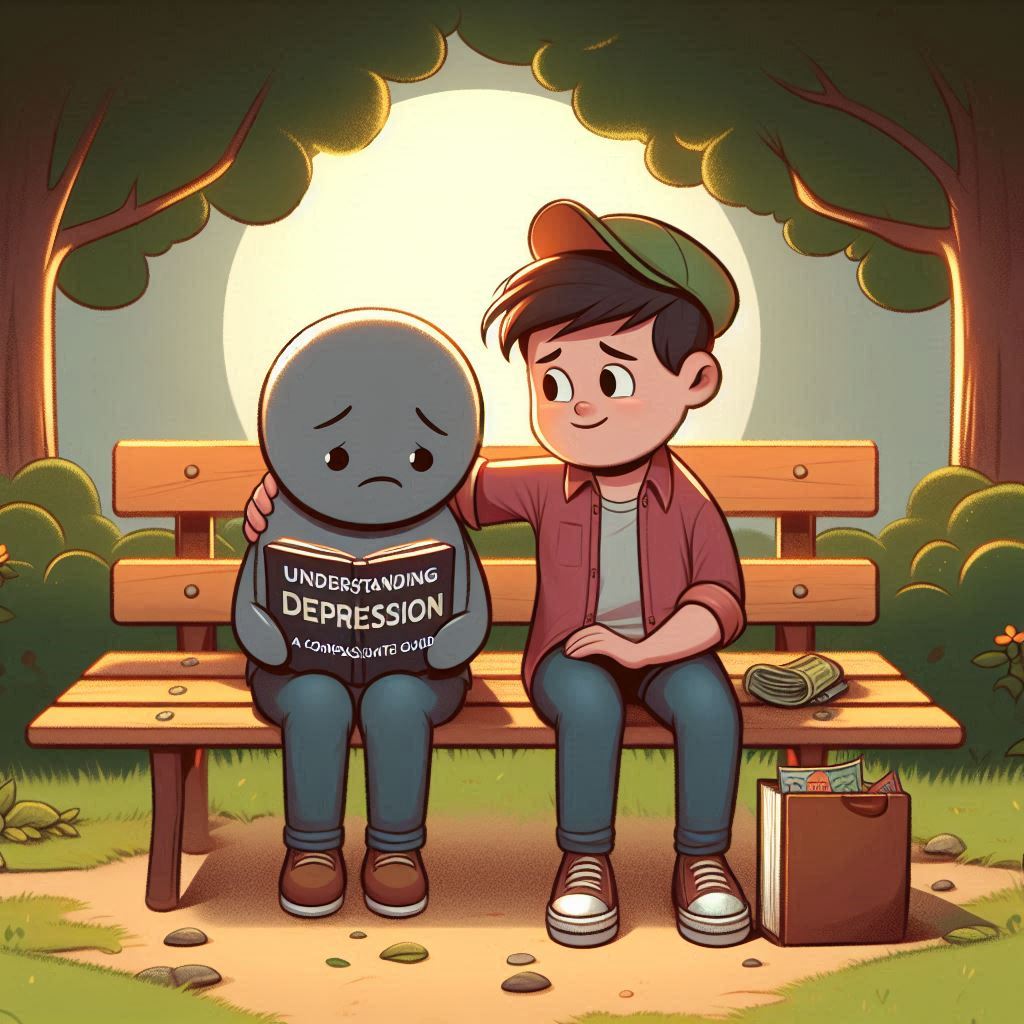Understanding Depression: A Compassionate Guide
Depression, also known as major depressive disorder, is a common and serious mental health condition that affects how you feel, think, and handle daily activities. It’s a widespread issue that touches millions of lives around the world, across all age groups. In fact, about 1 in 6 people will experience depression at some point in their lives.

Symptoms of Depression
Depression can manifest in various ways, and not everyone will experience the same symptoms. Here are some common signs to watch for:
Emotional Symptoms
- Persistent Sadness: Feeling deeply sad or empty for a prolonged period.
- Hopelessness: A sense that there is no way out of current difficulties.
- Worthlessness: Feeling like you don’t deserve happiness or that you’re not good enough.
- Guilt: Excessive guilt over past actions or mistakes.
- Irritability: Getting easily annoyed or agitated over small matters.
- Loss of Interest: No longer finding joy in activities or hobbies you once loved.
- Difficulty Concentrating: Struggling to focus or make decisions.
- Thoughts of Death or Suicide: Thinking about death, dying, or suicide.
Physical Symptoms
- Fatigue: Feeling extremely tired or lacking energy, even after rest.
- Sleep Changes: Difficulty falling or staying asleep (insomnia) or sleeping too much (hypersomnia).
- Appetite Changes: Significant weight loss or gain, or changes in appetite.
- Physical Pain: Unexplained aches, pains, headaches, or digestive issues.
- Slowed Movements: Moving or speaking more slowly than usual.
Behavioral Symptoms
- Withdrawal: Pulling away from friends, family, and social activities.
- Decreased Performance: Lower productivity at work or school, or difficulty meeting responsibilities.
- Neglect of Personal Care: Ignoring personal hygiene or grooming.
- Substance Use: Increased use of alcohol or drugs to cope.
Cognitive Symptoms
- Negative Thinking: Persistent negative thoughts about oneself, the world, or the future.
- Memory Issues: Difficulty remembering things or concentrating.
- Indecisiveness: Struggling to make decisions, even small ones.
Why is Depression So Common?
The high prevalence of depression can be attributed to various factors:
- Genetic Factors: Family history can increase the likelihood of experiencing depression.
- Biological Factors: Imbalances in brain chemicals like serotonin, norepinephrine, and dopamine can contribute.
- Psychological Factors: Traumatic or stressful life events, such as the death of a loved one, bullying, divorce, or financial problems, can trigger depression.
- Social Factors: Social isolation, lack of support, and poor relationships can play a role.
- Medical Conditions: Chronic illnesses like diabetes, heart disease, or chronic pain can increase the risk.
- Environmental Factors: Living in areas with high pollution, poor access to healthcare, or experiencing abuse or neglect can contribute.
- Lifestyle Factors: Poor diet, lack of physical activity, and insufficient sleep can all impact mental health.
Treatment Options
There are several effective treatments for depression:
1. Medications
- Antidepressants: Help balance brain chemicals that affect mood. Examples include SSRIs, SNRIs, and TCAs.
- Other Medications: Mood stabilizers or antipsychotics may be used in some cases.
2. Psychotherapy
- Cognitive Behavioral Therapy (CBT): Helps identify and change negative thought patterns.
- Interpersonal Therapy (IPT): Focuses on improving relationships and social functioning.
- Behavioral Activation: Encourages engagement in enjoyable activities.
- Problem-Solving Therapy: Develops effective coping strategies.
3. Lifestyle Changes
- Regular Exercise: Boosts mood and reduces symptoms.
- Healthy Diet: Improves overall well-being.
- Adequate Sleep: Crucial for mental health.
- Mindfulness and Relaxation: Practices like meditation and yoga can reduce stress.
4. Support Systems
- Family and Friends: Strong support networks can offer emotional encouragement.
- Support Groups: Provide a sense of community and shared experience.
5. Alternative Treatments
- Electroconvulsive Therapy (ECT): For severe cases that don’t respond to other treatments.
- Transcranial Magnetic Stimulation (TMS): Uses magnetic fields to stimulate brain cells.
It’s essential to work with a healthcare professional to determine the best treatment plan. Seeking help early can make a significant difference in managing depression effectively.
Depression is a challenge, but with the right support and treatment, it is manageable. If you or someone you know is experiencing symptoms of depression, reaching out for help is a vital first step. Remember, you’re not alone, and there is hope.
Author: Anonymous
If you are experiencing suicidal thoughts or if someone else may be at risk, please refrain from using this site.
